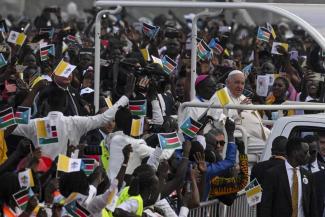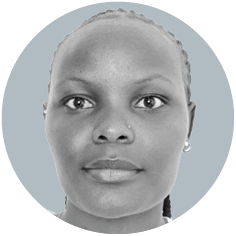Violent conflict
High hopes abounded during Pope’s visit to South Sudan

Pope Francis spoke of a “pilgrimage of peace”. He came at a time when citizens of the world’s youngest nation wanted to see real signs of change rather than only hear assurances from their leaders. Many South Sudanese interpret the presence of His Holiness as such a sign. The economy is in devastating state and ceaseless political turmoil haunts the country. Some hope the pontiff might act as a mediator. A handshake between the government and the opposition is urgently needed.
On his last day in South Sudan, the Pope held a mass at the John Garang Mausoleum. It is where the revolutionary leader who started the Sudan People’s Liberation Movement is buried. In the presence of the country’s top leaders, the head of the Catholic church condemned the never-ending violent clashes between government forces and rebel militias that have displaced some 2.4 million people, according to the UN High Commissioner for Refugees (UNHCR). Francis called for peace.
At the same time, he urged all South Sudanese not to lose hope in the peace process. Indeed, Juba showed unity during Pope Francis’ visit, with people chanting and carrying religious banners as well as the South Sudanese flag. The question is how long these good times will last.
People in Juba fear violence and typically shy away from stating their views in public. One Juba-based source, who did not wish to be named, said that the pope’s visit should serve as an eye-opener for those in power, make them listen to frustrated citizens and address the permanent security crises. But the source also pointed out that the short visit was just a glass half full and not enough to quench the thirst for peace, political stability and prosperity.
Another source praised the visit too, appreciating Francis’ display of humility and his appeal to people to serve one another. The fact that he addressed both government and opposition was read as a reason for optimism in a country ravaged by ethnic violence and damaged by corruption.
Pope attracts global attention
People also appreciated that the pope’s visit meant global attention. To a large extent, they feel neglected by the international community which shows pretty little interest in their continuous suffering. Francis is the first global leader in a long time to show a personal commitment to South Sudan – and that impresses people of all faiths.
Essential reforms to restore peace have not been implemented so far. What needs to be done was spelled out in the Revitalized Agreement on Resolution of Conflict in South Sudan (R-ARCSS) in 2018. A large number of optimists hope that Francis may have triggered new momentum for implementation, not least because Catholics are among the leaders of both the government and the opposition.
Sceptics, however, doubt his short presence in the country will make a long-term difference. What is obvious, however, is that the country needs new opportunities for investment, educational reform and progress in other areas.
In these matters, there is not much difference between the Pope’s trip to the Democratic Republic of Congo (DRC) and South Sudan. Both countries are resource rich and have long histories of civil strife. Both remain unstable, with violence erupting frequently.
In the DRC, such violence even had an impact on the pope’s agenda. The head of the Catholic church was supposed to visit the Kivu region in the troubled eastern DRC. Due to the ongoing conflict with armed militias in the area, he had to land in Kinshasa instead. Meanwhile, at least 20 people died in Kajo-Keji in western South Sudan and 300 others were displaced in a brutal act of cattle raiding, the day before the Pope was to land in Juba.
Faith leaders typically remain present in crisis areas, even when other institutions have largely disappeared. They have a pattern of challenging poor governance and violent abuse. The Christian faith has deep roots in both the DRC and South Sudan, and Catholic priests are serving local communities on the frontlines. No doubt, they will be encouraged by their top leader’s trip to their country.
Alba Nakuwa is a freelance journalist from South Sudan based in Nairobi.
albanakwa@gmail.com








